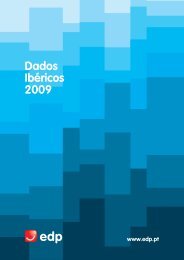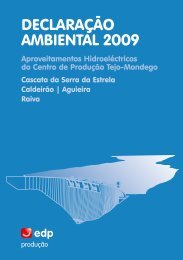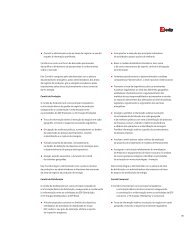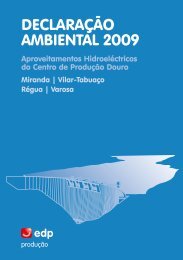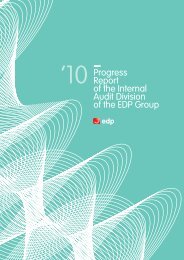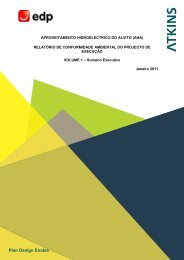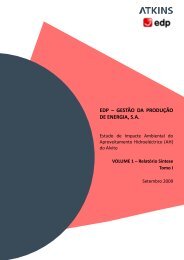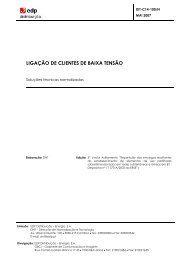Annual Report - EDP
Annual Report - EDP
Annual Report - EDP
- No tags were found...
Create successful ePaper yourself
Turn your PDF publications into a flip-book with our unique Google optimized e-Paper software.
: corporate governance :in share capital, the Executive Board of Directorsis authorised to approve one or more share capitalincreases up to an aggregate limit of 10% of thecurrent share capital totalling €3,656,537,715, byissuing category A shares to be subscribed bynew entries in cash in accordance with the termsand conditions of the issue defined by it. The draftdecision must be submitted for prior approval bythe General and Supervisory Board and requiresa majority of two-thirds of its members (Article (3)of <strong>EDP</strong>’s Articles of Association).The Executive Board of Directors may also submitto the General Meeting of Shareholders proposalsfor approval of capital increases after receivinga favourable prior opinion from the General andSupervisory Board. In these cases, the GeneralMeeting of Shareholders must approve the decisionto increase the capital (Article 17 (2) (g) and Article11 (2) (c) of <strong>EDP</strong>’s Articles of Association).II.11. Policy onrotation of positions- appointment andreplacement ofmembersThe hiring and permanent monitoring of the workof the external auditor are the responsibility ofthe General and Supervisory Board, pursuant toArticle 22 of <strong>EDP</strong>’s Articles of Association.The Statutory Auditor is elected by the GeneralMeeting of Shareholders, subject to an opinion fromthe General and Supervisory Board (Article 11 (2) (b)Article 22 (1) (c) of <strong>EDP</strong>’s Articles of Association).Evaluation of the Statutory Auditor and theexternal auditor’s independence in their relationswith the company is the responsibility of theGeneral and Supervisory Board - Article 22 (1) (c)of <strong>EDP</strong>’s Articles of Association (assisted by theCommittee on Financial Matters/Audit Committee,as per Article 4 (1) (j) of its regulations).The General Meeting of Shareholders elects anddismisses the members and chairman of theExecutive Board of Directors and General andSupervisory Board and the Statutory Auditor,on the proposal of the General and SupervisoryBoard or the Committee on Financial Matters/Audit Committee on its behalf pursuant to Article11 (2) (b) of <strong>EDP</strong>’s Articles of Association.These rules ensure the independence of theexternal auditor from the management body.Regarding the recommendation on rotation ofpositions, <strong>EDP</strong> considers that it applies to listedcompanies that opt for the so-called Anglo-Saxonand Latin models of organisation.II.13. Meetings of theExecutive Board ofDirectorsPursuant to Article 20 (1) of the Articles ofAssociation and Article 6 (1) of the Regulationsof the Executive Board of Directors, as a rule theExecutive Board of Directors meets every week, butmust have a meeting at least every two months.In 2012, the Executive Board of Directors held 50meetings and minutes of them were kept.The Chairman of the Executive Board ofDirectors sends the Chairman of the General andSupervisory Board the invitations, supportingdocuments and minutes of its meetings and, onrequest, provides any information requested ina timely, appropriate manner. The information isaccessible to all the members of the General andSupervisory Board and Committee on FinancialMatters/Audit Committee.<strong>EDP</strong> - <strong>Annual</strong> <strong>Report</strong> 2012The meetings of the Executive Board of Directorsin which the accounts of a financial period areappraised must be attended by the members of theCommittee on Financial Matters/Audit Committee.II.14. Incompatibilityrules andindependencecriteria<strong>EDP</strong>’s Articles of Association (Article 9 (1), Article11 (2) (d), Article 21 (4), Article 22 (1) (a), Article23 and Article 27) and the Internal Regulationsof the General and Supervisory Board (Article 7),both available on its website (www.edp.pt)set out rules on independence andincompatibilities for positions on any of thecompany’s corporate bodies.The independence criteria set out in <strong>EDP</strong>’s Articlesof Association are in line with those establishedin Article 414 (5) of the Company Code. Theydetermine that independence is the absence of anydirect or indirect relationship with the companyor its management body and the absence of anycircumstances that may affect impartiality inanalyses or decisions, for example as a result ofthe persons in question being holders or acting onbehalf of holders of qualifying holdings of 2% (twopercent) or more of <strong>EDP</strong>’s share capital or havingbeen re-elected for more than two terms of officein succession or intercalated.Pursuant to Article 9 (1) of <strong>EDP</strong>’s Articles ofAssociation, independence “is the absence of anydirect or indirect relationship with the companyor its management body and the absence of anycircumstances that may affect impartiality inanalyses or decisions, for example as a result ofthe persons in question being holders or actingon behalf of holders of qualifying holdings of 2%(two percent) or more of the company’s sharecapital or having been re-elected for more thantwo terms of office in succession or intercalated”.In view of the need to clarify the interpretationof Article 414 (5) of the Company Code, as therewere differing doctrine positions, Associaçãode Emitentes de Valores Cotados em Mercado(“AEM”) asked the CMVM for an opinion. TheCMVM stated that there was only a loss ofindependent status if, “on the basis of thecriterion of number of terms of office, analysis ordecision, the members of the supervisory bodiesof public limited companies who are elected orappointed for a first term and then re-elected insuccession or intermittently for a second andthird term are re-elected (i.e. for the third time)for a fourth term”.Each corporate body must assess theindependence of its members in accordancewith laws and regulations applicable at the time.Any divergence from criteria in non-mandatoryrecommendations that <strong>EDP</strong> must take intoaccount must be justified.In addition to applicable legal provisions onincompatibilities, as a way of safeguarding theinterests of the company and its shareholders,Article 10 (1) of the company’s Articles ofAssociation lays down that occupation of a positionin any corporate body at <strong>EDP</strong> is incompatible with:º º The status of a legal person that is a competitorof <strong>EDP</strong> or a company controlled by or ina group with <strong>EDP</strong>º º The status of a natural or legal person associatedwith a legal person that is a competitor of <strong>EDP</strong>º º Holding any office of any kind or for anypurpose, through appointment to a corporateoffice, a work contract or a service contract,with a legal person competing with <strong>EDP</strong>or a legal person associated with any<strong>EDP</strong> rival company123





